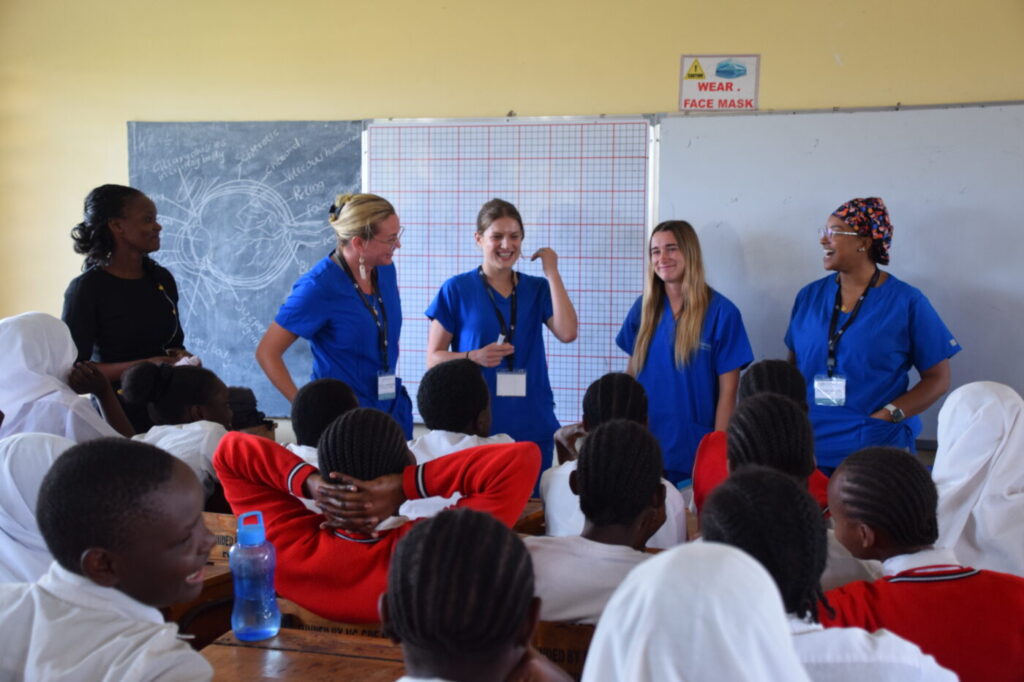Most medical schools expect 100-200 hours of volunteer work, with a focus on quality and consistency, especially in clinical settings.
In this article, we’ll break down how many volunteer hours are typically expected, why volunteer experience is crucial for your medical school journey, and how to make the most of your volunteering opportunities.
Why Is Volunteer Work Important for Medical School?

Volunteer experience is a critical component of your medical school application. It shows medical schools that you have a passion for helping others, that you’re committed to service, and that you have a well-rounded perspective on patient care and community needs. Volunteering also helps you develop valuable soft skills like empathy, communication, and teamwork—traits that are vital in the medical field.
Here’s why volunteer work is important for medical school:
- Demonstrates Commitment to Service: Medical schools want to admit students who have a strong sense of social responsibility and a desire to help others.
- Provides Patient Exposure: Volunteering in healthcare settings allows you to gain firsthand experience with patients and the healthcare system.
- Shows Passion and Dedication: Medical schools look for candidates who are not only academically gifted but also emotionally and mentally committed to the field of medicine.
- Strengthens Your Application: Volunteer work can help set you apart from other applicants by showcasing your dedication to medicine in a tangible way.
How Many Volunteer Hours Do You Need for Medical School?
While the exact number of volunteer hours required can vary by school, most medical schools expect applicants to have a significant amount of experience volunteering in healthcare or service-oriented roles.
General Guidelines for Volunteer Hours:
- Typical Range: Many successful medical school applicants have between 100 to 200 hours of volunteer experience. However, some applicants may have more, especially those who spent multiple years volunteering in healthcare or clinical settings.
- Quality Over Quantity: It’s not just about the number of hours, but the quality of your experience. Medical schools value long-term, meaningful volunteer work where you demonstrate consistency and dedication. A few hundred hours of impactful service will weigh more heavily than a higher number of hours with minimal involvement.
- Clinical Volunteer Hours: Medical schools often expect applicants to have clinical exposure—volunteering in hospitals, clinics, or with healthcare professionals. This helps you gain insights into patient care and the day-to-day realities of the medical field.
- Non-Clinical Volunteer Hours: Schools also appreciate applicants who demonstrate a broader commitment to service through volunteering in non-medical settings, such as community organizations, food banks, or working with underserved populations.
Does More Volunteer Work Improve Your Chances?
In general, there is no magic number of volunteer hours that guarantees acceptance to medical school. Instead, admissions committees look for quality and variety in your volunteer work. Volunteer experience should reflect your genuine interest in medicine, your ability to work with others, and your desire to make a difference.
While some students might have several hundred hours of experience, others may have fewer, but still demonstrate strong personal growth and dedication. Consistency and long-term commitment are key.
Also Read: What Happens If I Miss My Heart Medication – Missing Heart Medication Risks!
Types of Volunteer Work That Help Your Application:
The best type of volunteer experience will depend on your interests, skills, and availability. Here are some valuable volunteer opportunities for aspiring medical students:
Clinical Volunteering:

Clinical volunteering is perhaps the most important type of volunteer work for pre-med students. This could include working at hospitals, clinics, nursing homes, or hospices where you interact directly with patients or assist healthcare professionals.
Examples include:
- Hospital Volunteering: Shadowing doctors, assisting patients with daily tasks, or working in various hospital departments.
- Nursing Homes: Helping elderly residents with activities, socializing with patients, or providing companionship.
- Emergency Medical Services (EMS): Volunteering as a first responder or helping at medical events.
Community Service:
Medical schools want to see that you are committed to serving your community, whether or not it’s in a healthcare setting.
Some non-clinical volunteer opportunities include:
- Food Banks: Volunteering to help with food distribution or organizing community events.
- Homeless Shelters: Providing meals or basic healthcare assistance to homeless individuals.
- Youth or Elderly Mentoring: Volunteering at local schools, mentoring children, or assisting with elderly care programs.
Also Read: Do Medical Coders Have To Be Fast – Fast and Accurate Coding!
Research Volunteering:
While not strictly “service,” volunteering in a research lab can be a great addition to your medical school application. This demonstrates your ability to think critically, work in teams, and contribute to scientific discovery. Many medical schools value research experience, especially if it aligns with their focus areas.
Health Advocacy and Education:

Another great way to contribute is through volunteer work that promotes health education and advocacy.
Examples include:
- Health Fairs: Volunteering to help with local health initiatives or screenings.
- Public Health Campaigns: Working on campaigns for mental health awareness, vaccination drives, or smoking cessation programs.
How to Make the Most of Your Volunteer Experience?
Once you’ve decided how many hours you want to commit, it’s important to maximize the value of your volunteer work.
Here are some tips for making the most of your time:
- Be Consistent: Medical schools look for applicants who show long-term commitment to their volunteer work. Aim for steady involvement, such as volunteering weekly or monthly, rather than sporadic hours.
- Take on Responsibility: Try to take on more responsibility over time. Leading a team or organizing events will show initiative and leadership—qualities that are valued in medical school.
- Reflect on Your Experiences: Reflect on what you’ve learned from your volunteer work. When writing your personal statement or during interviews, be prepared to discuss how your volunteer work has shaped your desire to pursue medicine.
- Diversify Your Volunteering: While clinical experience is important, volunteering in different settings can showcase your ability to work with a variety of people and communities.
FAQ’s
1. How many volunteer hours are required for medical school?
Most medical schools expect between 100-200 hours of volunteer experience, with an emphasis on quality.
2. Is it more important to have many volunteer hours or quality experience?
Quality and consistency matter more than just the quantity of volunteer hours.
3. Do clinical volunteer hours matter more than non-clinical hours?
Clinical volunteer hours are highly valued, but non-clinical volunteer work also strengthens your application.
4. Does volunteering improve my chances of getting into medical school?
Yes, consistent and meaningful volunteer experience demonstrates dedication and commitment to medicine.
5. Can research volunteering help my medical school application?
Yes, research experience can showcase critical thinking and teamwork, which are valued by admissions committees.
Conclusion
In conclusion, there is no fixed number of volunteer hours required for medical school, but aiming for 100-200 hours of meaningful, consistent service is a good guideline. Focus on quality experiences that demonstrate your commitment to healthcare and helping others. A diverse range of volunteering—clinical, community, or leadership—will strengthen your application and passion for medicine.

Leave a Reply